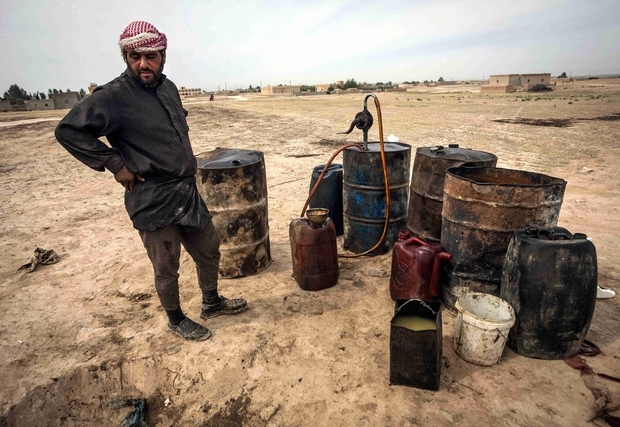'Today we import all our needs': Syrian ministers paint stark economic outlook

With oil production at its lowest in years, a total halt in phosphate exports and power generation sharply reduced, Syria's economy is on its knees, government ministers have said.
The ministers were speaking at a conference hosted by the British Syrian Society in Damascus this week titled "The War in Syria: Challenges and Opportunities".
The British Syrian Society is a pro-government think tank-which, founded by Syrian President Bashar al-Assad's father in law, Fawaz Akhras.
"The war has reached all economic resources, but has most systemically hit the petrol sector," said energy minister, Ali Ghanem.
"We used to produce and export petrol, but today we import all our needs," he said.
Crude oil production dropped 98 percent between 2010 and 2017 from 385,000 barrels per day to just 8,000, Ghanem added.
The government has lost control of many of the country's most important oil and gas fields to rebels, the Islamic State (IS) group or Kurdish fighters.
Natural gas production has fallen 52 percent from 21 million cubic metres (657 million cubic feet) per day in 2010 to just nine million (282 million) in 2017.
Before 2011, Syria was the fifth largest phosphate exporter in the world, producing 3.5 million tonnes a year, but now it produces none.
Ghanem said recent government victories, including the recapture of the Shaer oilfield last month, gave some cause for hope.
Around half a million people have been killed in the conflict, now in its eighth year, and half the entire population has been displaced internally, or forced to seek refuge outside of Syria.
Ghanem predicted a modest increase in crude output over the next few months to around 12,000 bpd and an increase in natural gas output to 11.5 million cubic metres (360 million cubic feet) per day.
He said he also hoped to see a significant resumption of phosphate production by the end of the year.
The sharp reduction in oil and gas output has had a knock-on effect on power generation.
Electricity Minister Mohammed Zuhair Kharboutli said the government had supplied 97 percent of needs before the war.
That proportion is now down to 27 percent because of the shortage of fuel.
Syria generated about 49 billion kilowatts per hour before the war, but is now producing just 19 billion.
"The total losses for the electricity ministry since the beginning of the war amount to two trillion Syrian pounds ($3.8bn)," Kharboutli estimated.
Middle East Eye propose une couverture et une analyse indépendantes et incomparables du Moyen-Orient, de l’Afrique du Nord et d’autres régions du monde. Pour en savoir plus sur la reprise de ce contenu et les frais qui s’appliquent, veuillez remplir ce formulaire [en anglais]. Pour en savoir plus sur MEE, cliquez ici [en anglais].




